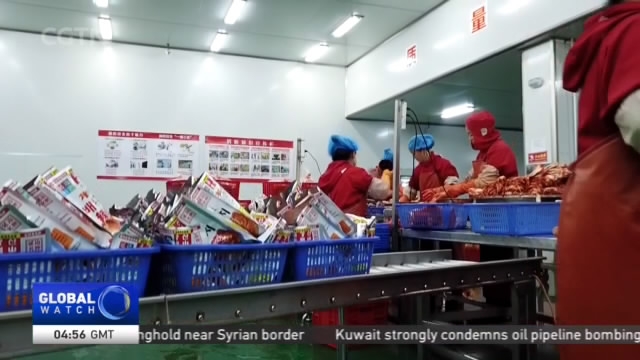
14:07, 12-Nov-2017
Kimchi Power: Chinese-made kimchi aims to conquer South Korean dinner tables

Even if you're not a big fan of Korean food, you'd still know kimchi. The fermented and pickled cabbage is a staple in Korean cuisine and is seeing a growing popularity among food lovers worldwide. But did you know in recent years, the kimchi on dinner tables in South Korea is largely imported from China? CGTN's Cui Hui'ao visited the largest kimchi manufacturer in Yanji City, in northeast China's Jilin Province to find out how exactly they've managed to dominate the market.
Mix, chop, serve. Restaurant owner Piao Lina is making kimchi for her patrons, a skill carried over from her mom.
PIAO LINA OWNER, NIUWEIQING RESTAURANT Almost every woman of Korean ethnicity knows how to make kimchi. It's a family tradition. Around this time of the year, the whole family gathers and makes kimchi together.
However, with large-scale manufacturing taking over, this tradition has faded over the years. Here in Yanji, this manufacturer produces around 20 tons of kimchi daily. The steps aren't that different from Piao's, but here -- everything is done through machines. Washed cabbage is cut into half and coated with salt for 16 hours, before rinsing and squeezing out excess liquid.
CUI HUI'AO YANJI One of the most important steps in making kimchi is to mix the cabbage with sauce. Apparently, the secret sauce includes more than a dozen spices, and should first be rubbed onto the cabbage with bare hands. After that, we allow the cabbage to be fermented for ten days.
This China-made kimchi will soon enter the South Korean market, which imports around 250 thousand tons of kimchi from China each year.
HA JAEHO GENERAL DIRECTOR, WORLD KIMCHI INSTITUTE Most of the imported kimchi is distributed to restaurants, not private homes. It means that most families make their own kimchi and consume kimchi produced in Korea. Restaurants stress the importance of price, so they want to buy cheaper ones.
Ha says Korean consumers have concerns about the food safety conditions in China. But according to the owner of this manufacturing plant, Chinese kimchi has lived up to international standards.
ZHAO YONGZHE, OWNER YANBIAN JINGANGSHAN FOOD COMPANY, LTD. Chinese regulations on kimchi production are stricter than in South Korea and other European nations, especially in terms of bacteria inspection and the use of additives.
Zhao holds the ambition of becoming the world's largest kimchi factory, exporting the popular food to not only South Korea, but also the rest of the world. Cui Hui'ao, CGTN, Yanji, Jilin Province.

SITEMAP
Copyright © 2018 CGTN. Beijing ICP prepared NO.16065310-3
Copyright © 2018 CGTN. Beijing ICP prepared NO.16065310-3